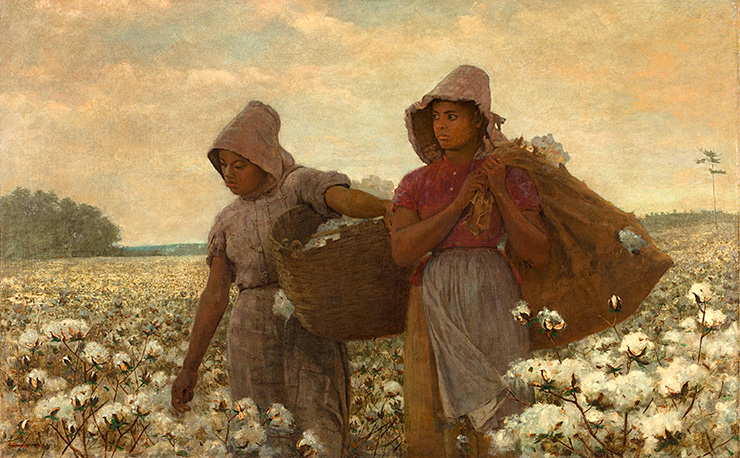Spiritual Sunday
One of today’s Old Testament readings is a lovely harvest celebration by the prophet Joel. I especially like the way it includes slaves in its blessing, which has led me to choose an 1849 poem by abolitionist and women’s right activist Phoebe Cary. Cary’s poem laments that, unlike New England farmers, slaves aren’t gathering their own produce.
While Cary does not allude directly to the Joel passage, there are other Biblical references, including the fearsome passage from Matthew 3:10, “The axe is already at the root of the trees, and every tree that does not produce good fruit will be cut down and thrown into the fire.” With that image, Cary anticipates how a Christian framework will be employed to support the war against the slave-holding South, as seen in “The Battle Hymn of the Republic.”
Here’s the passage from Joel (2:23-32):
O children of Zion, be glad
and rejoice in the Lord your God;
for he has given the early rain for your vindication,
he has poured down for you abundant rain,
the early and the later rain, as before.
The threshing floors shall be full of grain,
the vats shall overflow with wine and oil.
I will repay you for the years
that the swarming locust has eaten,
the hopper, the destroyer, and the cutter,
my great army, which I sent against you.
You shall eat in plenty and be satisfied,
and praise the name of the Lord your God,
who has dealt wondrously with you.
And my people shall never again be put to shame.
You shall know that I am in the midst of Israel,
and that I, the Lord, am your God and there is no other.
And my people shall never again
be put to shame.
Then afterward
I will pour out my spirit on all flesh;
your sons and your daughters shall prophesy,
your old men shall dream dreams,
and your young men shall see visions.
Even on the male and female slaves,
in those days, I will pour out my spirit.
I will show portents in the heavens and on the earth, blood and fire and columns of smoke. The sun shall be turned to darkness, and the moon to blood, before the great and terrible day of the Lord comes. Then everyone who calls on the name of the Lord shall be saved; for in Mount Zion and in Jerusalem there shall be those who escape, as the Lord has said, and among the survivors shall be those whom the Lord calls.
In Cary’s poem, we begin with such images of a plentiful harvest, with perhaps allusions to Psalm 126:6, “He that goeth forth and weepeth, bearing precious seed, shall doubtless come again with rejoicing, bringing his sheaves.” But there are apocalyptic images even amidst this rejoicing, such as the reference to a bow being set. Perhaps she is thinking of the bow in Psalms 7:11-13:
God judgeth the righteous, and God is angry with the wicked every day. If he turn not, he will whet his sword; he hath bent his bow, and made it ready. He hath also prepared for him the instruments of death; he ordaineth his arrows against the persecutors.
We learn about the wicked in the third stanza, where the bounteous harvest brings to mind a gathering where one does not hear grateful singing. Where “oppression casts her deadly root,” there are heard instead “dull cries of almost dumb despair.”
The poem ends with a hopeful image, however. Dare to dream, Cary tells us:
So that the day-star, rising from the sea,
Shall light a land whose children will be free!
The Harvest Gathering
By Phoebe Cary
The last days of the summer: bright and clear
Shines the warm sun down on the quiet land,
Where corn-fields, thick and heavy in the ear,
Are slowly ripening for the laborer’s hand;
Seed-time and harvest — since the bow was set,
Not vainly has man hoped your coming yet!
To the quick rush of sickles, joyously
The reapers in the yellow wheat-fields sung,
And bound the pale sheaves of the ripened rye,
When the first tassels of the maize were hung;
That precious seed into the furrow cast
Earliest in spring-time, crowns the harvest last.
Ever, when summer’s sun burns faint and dim,
And rare and few the pleasant days are given,
When the sweet praise of our thankgiving hymn
Makes beautiful music in the ear of Heaven,
I think of other harvests whence the sound
Of singing comes not as the sheaves are bound.
Not where the rice-fields whiten in the sun,
And the warm South casts down her yellow fruit,
Shout they the labors of the autumn done —
For there Oppression casts her deadly root,
And they, who sow and gather in that clime
Share not the treasures of the harvest-time.
God of the seasons! thou who didst ordain
Bread for the eater who shall plant the soil,
How have they heard thee, who have forged the chain
And built the dungeon for the sons of toil?
Burdening their hearts, not with the voice of prayer,
But the dull cries of almost dumb despair.
They who would see that growth of wickedness
Planted where now the peaceful prairie waves,
And make the green paths of our wilderness
Red with the torn and bleeding feet of slaves —
Forbid it, Heaven! and let the sharp axe be
Laid at the root of that most poison tree!
Let us behold its deadly leaves begin
A fainter shadow o’er the world to cast,
And the long day that nursed its growth of sin
Wane to a sunset that shall be its last;
So that the day-star, rising from the sea,
Shall light a land whose children will be free!


